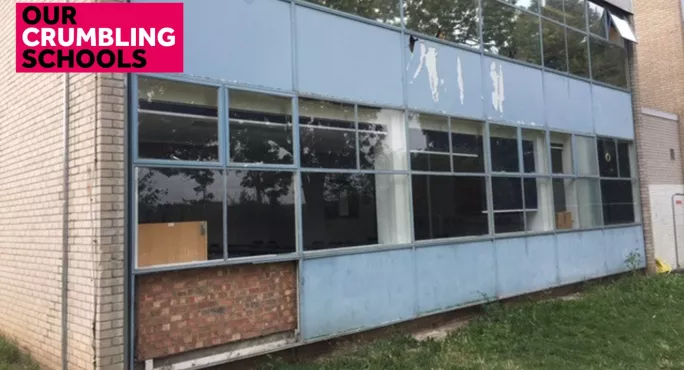- Home
- Exclusive: Call for major building programme to tackle ‘national decay’
Exclusive: Call for major building programme to tackle ‘national decay’

A headteachers’ leader has warned there is urgent need for a rebuilding programme for more major schools after a survey revealed two-thirds of heads said their buildings were not fit for purpose.
Geoff Barton, the general secretary of the Association of School and College Leaders has said the findings of the new poll show the country’s schools are in “a state of national decay.”
The Department for Education has said that it is investing £23 billion over five years in the school estate to deliver new places and to maintain and improve buildings.
It has also started a new school condition data collection to allow it to better understand where funding is needed most.
However Mr Barton has called for a “more substantial phased capital programme” to replace, refurbish and repair existing school buildings.
He warned that the current situation was not sustainable and said working in poor buildings made it more difficult to retain and recruit staff.
The survey carried out by ASCL and Tes questioned 221 headteachers, mainly in secondary schools, at the end of the last academic year.
It reveals that 70 per cent of heads said their school building was not fit for purpose.
The most commonly cited problems were leaks, asbestos and lack of space.
Heads also raised concerns about crumbling walls, faulty boilers and heaters and electrical problems.
Of the 155 heads who said their buildings were not fit for purpose almost three-quarters of them, 114, said they had problems with leaks.
There was also 105 schools highlighting concerns about asbestos, while crumbling walls were highlighted by 92 schools.
Mr Barton said: “School buildings should be places which are conducive to learning - in a good state of repair, with appropriate space, and reliable electrics, boilers and plumbing.
“Unfortunately this is not remotely the case in many schools because of government underinvestment in this vital part of our national infrastructure.
“Leaking roofs, crumbling classrooms, cramped and poorly ventilated buildings, and inadequate sports facilities, are the realities of life in far too many schools.”
Mr Barton highlighted the National Audit Office report last year that warned it would cost £6.7 billion to bring all school buildings to satisfactory or better condition.
He added: “It also stated that funding for maintaining the school estate has fallen since 2010-11 and that the Department for Education expects that the condition of the school estate will deteriorate in future.
“As our survey shows, many schools don’t have enough money to cover even essential work, let alone wider refurbishment and maintenance projects.
“And this situation is made worse by the real-terms cuts which have taken place since 2015 to revenue budgets which have meant schools have less money available to spend on day-to-day maintenance.
“There is a clear and urgent need for a more substantial phased capital programme to replace, refurbish and repair school buildings and ensure that all school premises are fit for purpose.”
Another headteacher, commenting anonymously on the survey, echoed this.
They said: “I believe that there must be a national strategic plan for replacing school buildings and temporary accommodation which is fully funded.
“Our students have to learn in classrooms which are too small, cold in winter due to old buildings not being insulated and an inadequate heating system, mobile classrooms which are expensive to hire and on a site where students and staff with certain disabilities are prevented from learning/working. Current funding is totally insufficient to maintain the buildings to a high standard.”
A DfE spokeswoman said: “We are investing £23 billion in the school estate between 2016 and 2021 to deliver new school places, maintain and improve school buildings, as well as rebuild and refurbish buildings in the worst condition through our Priority School Building Programme (PSBP).
“This funding supports our priority of ensuring there are sufficient school places and that the school estate is safe and enables a high-quality education.
“We have also begun a new school Condition Data Collection, which will provide updated data on the school estate and allow us to better understand where funding is needed most.”
It was revealed earlier this year that the second phase of PSBP had underspent and its completion date was being pushed back a year.
Keep reading for just £1 per month
You've reached your limit of free articles this month. Subscribe for £1 per month for three months and get:
- Unlimited access to all Tes magazine content
- Exclusive subscriber-only stories
- Award-winning email newsletters



